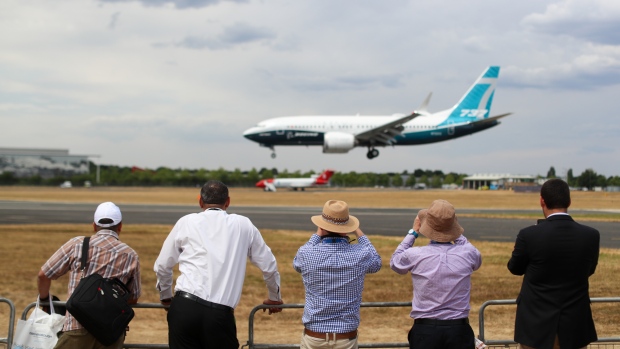Nov 20, 2018
Boeing said to cancel call with airlines over jet in fatal crash
, Bloomberg News

Boeing Co. canceled a conference call with airlines that fly its 737 Max aircraft to discuss the model involved in a fatal Indonesia crash, people familiar with the situation said.
No reason for the delay was given, said the people, who asked not to be identified since the call was to be private. The call, which had been slated for Tuesday morning in the U.S., is expected to be rescheduled, one of the people said.
The change in plans comes as Boeing attempts to contain criticism stemming from the deadly Lion Air crash last month. The planemaker’s stock has dropped 11 per cent since the crash as investors fret about the company’s liability for a system possibly tripped up by a single point of failure -- a bad sensor reading -- along with tarnish to the 737 brand, the Boeing’s largest source of profit. The shares were down 3.9 per cent in premarket trading after falling 4.5 per cent to close at US$320.94 in New York on Monday.
The call was intended to let Boeing field queries all at once from airlines worldwide flying the Max, instead of having multiple individual conversations on the same points, said one of the people familiar with the situation. The planemaker was also to go over differences between the Max, the most recent version of Boeing’s best-selling airplane, and the model that preceded it. CNBC earlier reported that the call had been canceled.
If the call is rescheduled, airlines will have the chance to get more details about a little-known anti-stall feature of the Max that has emerged as an area of focus for investigators as they try to figure out what caused the Lion Air Flight 610 to crash on Oct. 29 into the Java Sea near Jakarta. Before the accident, Boeing hadn’t widely disclosed that the so-called Maneuvering Characteristics Augmentation System would, in limited circumstances, lower the jet’s nose without any input from pilots.
Global Carriers
More recently, Boeing has provided assurances to Max operators and their pilots that they’ve fully disclosed all other crucial changes to the upgraded 737. Southwest Airlines Co., American Airlines Group Inc., Norwegian Air Shuttle ASA and United Continental Holdings Inc. are among carriers flying the Max.
The Chicago-based planemaker declined to comment on the canceled call. “While we can’t discuss specifics of an ongoing investigation, we have provided two updates for our operators around the world that re-emphasize existing procedures for these situations,” Boeing said in a statement Monday.
The MCAS safety system is designed to automatically push down the nose of the plane if it is in danger of losing lift on the wings, a condition known as an aerodynamic stall.
If a so-called angle-of-attack sensor shows that the aircraft is pointed too high relative to the oncoming air, a flight computer automatically pushes down the nose. The MCAS system only works while pilots are manually flying the plane.
In the case of the Lion Air episode, erroneous angle-of-attack gauge signals may have essentially tricked the plane into thinking it was in danger and commanded a dive, according to Indonesia’s National Transportation Safety Committee.
“The crash of a Lion Air Boeing 737 MAX won’t end the program, and we believe the fix will be largely aimed at training and software changes with manageable costs,” George Ferguson, an analyst with Bloomberg Intelligence, said in a report Monday.
--With assistance from Julie Johnsson
